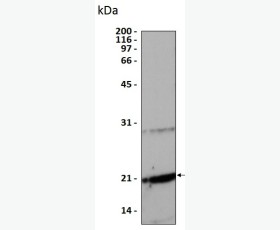Recombinant Human Fibroblast Growth Factor 23/FGF-23
| Product name: | Recombinant Human Fibroblast Growth Factor 23/FGF-23 |
| Source: | E.coli |
| Purity: | Greater than 95% as determined by reducing SDS-PAGE. |
| Buffer Formulation: | Lyophilized from a 0.2 μm filtered solution of 20mM PB,150mM NaCl,1mM EDTA,2mMDTT,pH7.4. |
| Applications: | SDS-PAGE, Western Blot (WB), ELISA (EIA), Immunoprecipitation (IP) |
| Storage: | Avoid repeated freeze/thaw cycles. Store at 2-8 degree C for one month. Aliquot and store at -80 degree C for 12 months. |
| UOM: | 100ug/50ug/200ug/1mg/1g |
| Source | Human Cells |
| Description | Recombinant Human Fibroblast Growth Factor 23 is produced by our Mammalian expression system and the target gene encoding Tyr25-Ile251 is expressed with a 6His tag at the C-terminus. |
| Names | Fibroblast Growth Factor 23, FGF-23, Phosphatonin, Tumor-Derived Hypophosphatemia-Inducing Factor, FGF23, HYPF |
| Accession # | Q9GZV9 |
| Formulation | Lyophilized from a 0.2 μm filtered solution of 20mM PB,150mM NaCl,1mM EDTA,2mMDTT,pH7.4. |
| Shipping |
The product is shipped at ambient temperature. |
| Reconstitution |
Always centrifuge tubes before opening. Do not mix by vortex or pipetting. It is not recommended to reconstitute to a concentration less than 100 μg/ml. Dissolve the lyophilized protein in ddH2O. Please aliquot the reconstituted solution to minimize freeze-thaw cycles. |
| Storage |
Lyophilized protein should be stored at < -20°C, though stable at room temperature for 3 weeks. Reconstituted protein solution can be stored at 4-7°C for 2-7 days. Aliquots of reconstituted samples are stable at < -20°C for 3 months. |
| Purity |
Greater than 95% as determined by reducing SDS-PAGE. |
| Endotoxin | Less than 0.1 ng/µg (1 IEU/µg) as determined by LAL test. |
| Amino Acid Sequence |
YPNASPLLGSSWGGLIHLYTATARNSYHLQIHKNGHVDGAPHQTIYSALMIRSEDAGFVVITGVM SRRYLCMDFRGNIFGSHYFDPENCRFQHQTLENGYDVYHSPQYHFLVSLGRAKRAFLPGMNPPPY SQFLSRRNEIPLIHFNTPIPRRHTRSAEDDSERDPLNVLKPRARMTPAPASCSQELPSAEDNSPM ASDPLGVVRGGRVNTHAGGTGPEGCRPFAKFIVDHHHHHH
|
| Background | Fibroblast Growth Factor 23 (FGF-23) is a secreted protein that belongs to the heparin-binding growth factors family. FGF-23 is expressed in osteogenic cells, particularly during phases of active bone remodeling. FGF family members possess broad mitogenic and cell survival activities, involved in a variety of biological processes including embryonic development, cell growth, morphogenesis, tissue repair, tumor growth, and invasion. FGF-23 regulates homeostasis of phosphate and vitamin-D metabolism. FGF-23 inhibits renal tubular phosphate transport by reducing SLC34A1 levels, and negatively regulates osteoblast differentiation and matrix mineralization. FGF-23 also upregulates EGR1 expression in the presence of KL, acts directly on the parathyroid to decrease PTH secretion. Defects in FGF-23 are the cause of autosomal dominant hypophosphataemic rickets (ADHR). |
| References |
Exercise-stimulated FGF23 promotes exercise performance via controlling the excess reactive oxygen species production and enhancing mitochondrial function in skeletal muscle |














